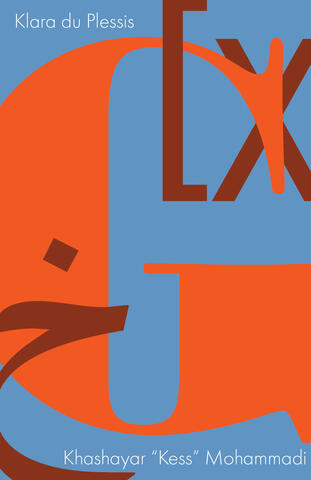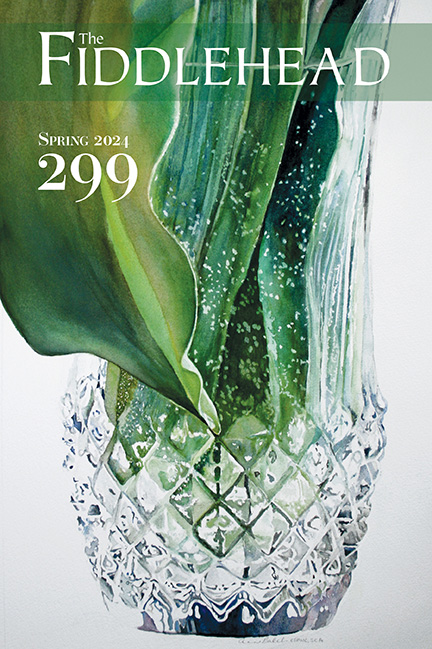
Nestle In Words Like An Animal: The Poetic G/Rasp of Tongue, Throat, and Mouth in G by Kirby
G, Klara du Plessis & Khashayar “Kess” Mohammadi. Palimpsest Press, 2023.
First, let’s talk about the design/packaging of this book.
It’s exquisite. The colour palette, fonts, printed endpapers, on signature Coach House zephyr, readable text on the page. A book you want to pick up, hold, caress with the eyes and the touch. Congrats to in-house designer Ellie Hastings, editor Jim Johnstone, and publisher Aimee Parent Dunn. Finery.
Further good news. G is well worth it. The design, and the read.
There’s two things about Canadian poets these days: many are working on a novel and there’s a rising trend to collaborate. I sorta get the novel thing, but I’ve been on enough non-profit arts boards to know how hit & miss collaboration can be — it don’t come easy. It’s just as apt to get nothing done, break up, fall apart. And/or, be admirable, come close. A welcome oddity.
Of note, Palimpsest published an earlier collab this year between two powerhouses, Roxanna Bennett and Shane Neilson (The Suspect We) where genuine inquiry and declarations wax poetically on every page and the synergy of the two, each emboldened, urges the other on.
It’s similar with poets, Klara du Plessis and Khashayar ‘Kess’ Mohammadi’s G. And a completely different sense of play.
Two strong poets/writers, both translingual, translators, Afrikaans & Persian, each with a few collections/projects under their belts including other collaborative works, both intensely interested in the physicality, phonetic roots, the sound of poetry. Its vibratory-ness.
And, intercourse (“my mother tongue aching in yours”), its opener and constant refrain: gaps, tiny gateways, the illusion of arm, leg, torso, pores, mouths . . .
through the skin in an unseeable slit of light,
through organs and out back.
Print writing is less dishonest,
The hand lifts between letters.
Dots and lines hover and intersect,
but retain occasional autonomy.
Flickers of text, dusk, and ink, composite in unity,
relax into the hospitality of meaning.
This is what G sets out to do and does well — discovery — what is there to be found here in tone, in hovering, in proximity, words themselves act as things to play with, to try on, take off, the words become fleshy or something to step into, toss across your shoulders, tongue.
Rodin does this with clay — breathes, sculpts life into being, and with G the tongue is the brush, the throat its well, the page the surface we touch in so many ways. Utterances of the self? ‘blossoming, blooming, blighted,’ I love this idea of life being inked, mouthed, nestled into being.
It may help that I love what words (consonants, syllables) do with the mouth, tongue, lips, throat, the physicality of speech, read quietly or aloud, its remarkable instrumentation which is continuously at play, scoring each page of G:
at least a rasp
of what we write.
The affricate fits nice in the fist.
The fricative dislocates the jaw.
The affricate fits in teeth.
(through practice)
clarify.
The genius of this collection is that we’re in on the discovery; it continuously seeks openings, provokes, invites us to play along, even when it’s just to watch them play. Yes, wordplay, how things stand alone, mesh, but it also does something that is extremely rare these days. It invites us to consider, to think, to find our own ways to connect with the thoughts/passages played out on the page. Each page something new to consider, new imaginings on the playground, multitudinous ways to make use of tongue, ink & surface. To meet, connect cursively. In. Out. Intercourse.
Remarkably, G points to, holds forth an essential key to what makes poetry poetry. Not the love of language but that language itself courts, woos, enters, begs us to come hither, nestle.
And, this makes me smile.
My poem is a shard.
This poem is a sharing. Against all odds
share is poem in Persian.
And how English at the best of times, is a far too restrictive dominating parent. My own English tongue tends to be lazy, leans towards a southern drawl, less familiar with klinkers (clink click) or anything gutteral.
Once I was told I would never get a person’s name right so don’t even bother trying. Not something that goes down easy for a Taurus, still, as G insists, tongues are distinct. “Ast is the difference between is and is.” One Persian, the other Afrikaans.
Under the viscous surface
of all that is written
lies the puritanical tongue
of the non-reverential.
The mouth as bulwark
guarding the sleep-tongue
from spilling into waking life.
There are footnotes on most pages: a glossary of sorts, origins, definitions, distinctions. Pretty list poems unto themselves.
Who couldn’t love a word like gorg o meesh from the Persian: twilight; literally wolf and sheep; the time of daylight during which a wolf is indistinguishable from a sheep.
It’s final section, “Speech,” harf (Persian), composed “out loud” between the poets listening. “Listen!,” they hark/harf:
K Klara K Khashayar
we crash
into the poem
razed ledges and raised tongues
retroflex but still rasping
in this pulmonic little sound.
Does the collection always succeed? Admittedly, I was lost at times, but never lost interest. I remember as a young reader I would just pass over words I didn’t know to see if the sentence or what followed held any clues to what it might possibly mean. How lovely to ignite this spark plug again. “I lick with my serrated tongue this envelope that holds / Every letter and a letter to you.” G is hot. Raspy hot. Sweet thing I can still blush.
— Kirby’s new collection she is out Spring 2024 from knife | fork | book











